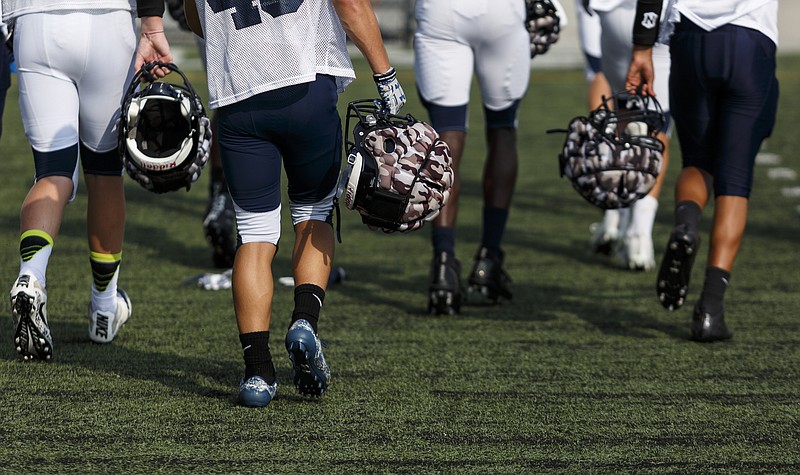"If you really want to get rid of a lot of these helmet-to-helmet hits, take the face masks off."
When McCallie School football coach Ralph Potter spoke those words a couple of years ago, he meant it as a joke. Sort of.
But it appeared to make at least a wee bit of sense. If guys knew they'd get their noses broken or teeth knocked out or worse - possibly far worse - whenever they collided with an opponent's equally unprotected face, perhaps they'd start wrapping up their foes somewhere noticeably below the head and neck.
But then research surfaced regarding serious injuries in rugby, which has no headgear. According to an Auckland University of Technology study from 2011, a comparison of catastrophic incidents (i.e., paralysis or death) between rugby and other sports from 1975 through 2005 revealed rugby incidents worldwide showed 4.6 catastrophic injuries for every 100,000 players, while American football was responsible for 1.0 catastrophic incidents per 100,000 players.
So even with all the justifiable concern over helmet-to-helmet contact, wearing a helmet with a face mask is still using your head for what it was intended, which is to think and reason.
We write this after Elizabeth Fite's excellent story in Sunday's Times Free Press concerning a recent report in the Journal of the American Medical Association regarding the examination of brains of deceased football players at the high school, college and professional levels.
According to the study, nearly 88 percent of those brains showed signs of chronic traumatic encephalopathy, or CTE, a degenerative brain disease thought to be caused by repeated head trauma.
And quite naturally, the longer those players played, the higher their risk, to the point that 110 of 111 pro players' brains tested were found to have some evidence of CTE. To be fair, these brains came only from families who already suspected their loved ones had developed CTE, as opposed to randomly picking brains to study. (Note: Only deceased brains provide accurate CTE information.)
But the fact that 48 of 53 college players' brains that were tested also showed signs of the disease - it was three of 14 at the high school level - should alarm everyone who has ever been dinged in the head a single time while playing America's most popular and violent team sport.
I've covered college football for at least a portion of each and every one of the 34 years I've worked for this newspaper. I believe hits to the head are in noticeable decline for the first time due to an increased emphasis on changing that culture.
Is it enough? Probably not. As long as television giants such as ESPN replay and glorify such unnecessary violence - even if only to highlight the occasional penalty - it will survive. Or, for those who recall last season's Texas-Notre Dame game, the incredible non-penalty by a Big 12 crew that somehow failed to see what appeared to be a textbook case of targeting in the end zone, of all places. And if it wasn't textbook, it should have been.
Regardless, the game would be just fine if all hits above the chest area were outlawed. Emphasize leading with the shoulder instead of the head and push to hit from the chest down with arms locked. No single-wing shots, either. Two arms wrapped around the ball carrier, preferably around the waist or upper legs.
Would it frustrate the more bloodthirsty fan, the one who probably also loves those mixed martial arts bouts for all their blood and savagery? Certainly. And too bad. We're supposed to evolve as a society. We now warn people extensively about the dangers of cigarettes and tax them to the point of all but drumming them out of existence. We've similarly penalized drunk driving to worthwhile results.
No offense to those who seem to revel in football's physicality and toughness, but safety should trump savagery. And within five years, no one would care. Football fans, particularly at the pro level, basically want two things. They want their team to win, and they want to win the money they gambled on games that weekend.
That's it. And if that's not enough, if they start to turn off the television or turn down tickets because there's just not enough violence anymore, maybe they needed a shrink all along.
A couple of years ago, gifted and much-decorated Boston Globe sports columnist Bob Ryan noted on ESPN's quite sadly now-defunct 'Sports Reporters" that football won't be in trouble until mothers refuse to let their sons play.
There is surely much truth in that. And the game still has plenty of positives. It's still the best teacher of teamwork in sports. It still teaches mental and physical toughness. It's still the best way for 100,000 people of diverse backgrounds to spend an autumn afternoon or evening together.
But something former Atlanta Falcons defensive back Bobby Butler said during a "Heads Up" clinic he helped conduct here four years ago regarding the proper way to tackle should be repeated to every youngster, young adult or seasoned pro who pulls on a football helmet this week.
"Your day is coming when you're not playing anymore," Butler said, "and those hits will come back to haunt you."
As Ryan so sagely observed, if it continues to haunt enough of those players to turn their mothers against the sport, it could haunt football's future. Just don't expect rugby to blossom as an alternative.
Contact Mark Wiedmer at mwiedmer@timesfreepress.com.
